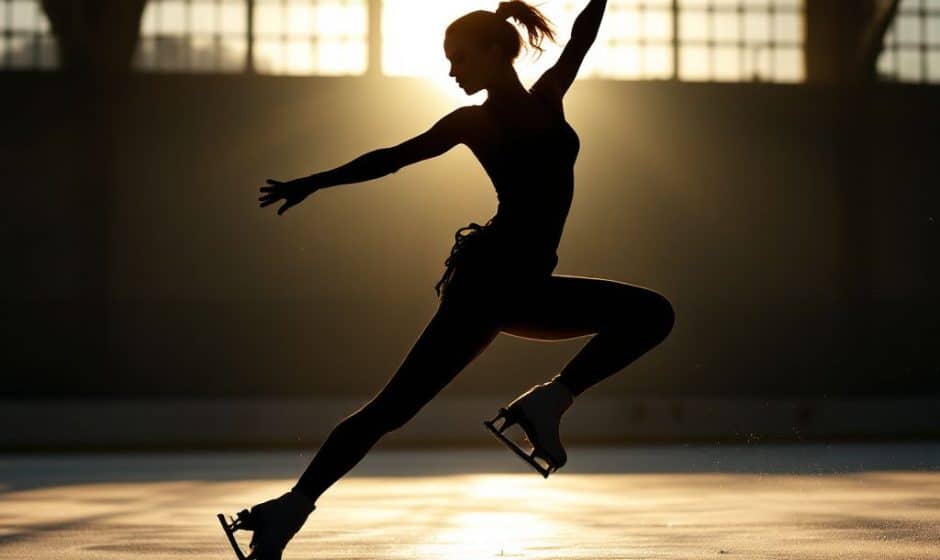If you’ve ever watched a figure skater glide across the ice with effortless grace, orchestrating jumps and spins that seem to defy gravity, you might wonder – what’s their secret? While hours of training play a massive role, there’s an unseen hero at work within every figure skater: hormones. Understanding hormone regulation and its influence on a skater’s health is essential for anyone involved in this icy dance.
Let’s break this down into easy, bite-sized pieces. Consider hormones as the unsung conductors of your body’s orchestra. They manage everything from energy levels to mood swings. And, yes, in sports like figure skating, they can influence athletic performance tremendously. Let’s dive into exactly how and why.
What are Hormones and Why Do They Matter on Ice?
Picture hormones as chemical messengers traveling through your bloodstream, delivering critical information to different parts of your body. They’re like your body’s personal instant messaging system. When everything’s running smoothly, you’re skating like Yuzuru Hanyu, tapping into that deep reservoir of power, precision, and flexibility.
But when hormone levels are off – stuff hits a bit of a snag. Think sluggish workouts, unexpected lows, and iffy sleep. For figure skaters, who need to maintain both physical finesse and mental edge, hormone regulation is not just a science, it’s an art.
Key Hormones That Impact Figure Skating
1. Adrenaline
You’ve been there – those final moments before stepping onto the ice when your heart’s racing and butterflies are doing Olympic-worthy flips in your stomach. That’s adrenaline kicking in. It’s crucial for competitive performance as it increases your heart rate and energy demand while keeping you alert, allowing skaters to execute complex routines with flair.
**But there’s a twist:** Too much adrenaline circulating too often can lead to fatigue or burnout. Balance is key.
2. Cortisol

Let’s call cortisol the “stress hormone.” It’s like caffeine in hormone form; great when you need a push, not so much in excess. Cortisol helps figure skaters manage stress, but chronic high levels can lead to poor immune function and hinder muscle recovery.
**Skaters’ tip:** Ensure downtime with yoga or meditation to keep cortisol levels in check.
3. Testosterone and Estrogen
Although often labeled as the male and female hormones, respectively, everyone has both, just in different amounts. These hormones affect muscle mass and strength, influencing bone density and physical growth in young skaters.
We can’t ignore puberty here. Navigating these hormonal changes for young athletes can be challenging. But with proper guidance, these hormonal shifts can be managed, keeping young skaters at the top of their game.
The Vital Role of Nutrition In Hormone Balance
Alright, here comes the fun part – food! Nutrition isn’t just about fueling up; it’s vital for hormone balance which, in turn, keeps your skating performance in top gear.
**Insiders’ take:** A diet rich in whole foods, lean proteins, healthy fats, and complex carbohydrates thrives on stabilizing hormone levels. Include omega-3 fatty acids (found in fish like salmon), which help regulate mood and inflammation – a neat little trick for combatting all that spinning and landing impact.
Foods to Embrace:
- Leafy Greens: They’re like little warriors fighting inflammation.
- Nuts and Seeds: Think flaxseeds, which are packed with nutrients beneficial for estrogen balance.
- Lean Proteins: Chicken, fish, tofu; helping with muscle repair.
Foods to Limit:
- Refined sugars and processed foods – they might taste great but can spike insulin, causing hormonal imbalances.
- Excessive caffeine and alcohol – they can throw your cortisol levels out of whack.
Skating Through Hormones During Different Life Phases
Since hormone regulation isn’t a one-time deal but an ongoing process, let’s briefly skate through some life phases:

Adolescence – Tackling the Growth Surge
This period can be unpredictable, as the body navigates enormous changes. Parents and coaches have their hands full, guiding young skaters to embrace these changes while maintaining focus.
**Helpful tip:** Prioritize well-balanced meals to support growth without adding undue pressure on developing bones and muscles.
Young Adulthood – Peak Performance Years
Many skaters find their peak during these years. With practices squeezed around school or work, time management becomes critical, and so does managing stress and diet for optimal hormone levels.
Beyond Young Adulthood – Maintaining Fitness
Hormones don’t just stop affecting us. Post-young adulthood, the focus may change more toward maintaining fitness levels and handling potential stressors that come with life changes.
Strategies for Effective Hormone Regulation
Gaining a competitive advantage on the ice isn’t just about the hours logged at practice. In fact, efficiently regulation can separate good skaters from great ones.
Managing Stress
Remember Cortisol, the stress buddy we met earlier? Keeping its levels from spiking involves developing healthy coping strategies, such as mindfulness and alcohol moderation, both of which beautifully dovetail with active recovery days.
Prioritizing Sleep

Never underestimate the power of Zzz. Glorious REM cycles help in hormone rebuilding, so aim for 7-9 restful hours a night. Your body – and skating spirals – will thank you.
Personal Training Plans
Every skater is unique, and so are their hormonal needs. Engaging with a sports nutritionist that specializes in skater health can help tailor optimal training and dietary guidelines that support hormone regulation effectively.
Common Mistakes Skaters Make and How to Avoid Them
It’s easy to fall into a few traps when balancing hormones as a figure skater. By addressing these, you can save yourself potential setbacks and avoid annoying bumps in your training journey:
- Underfueling:
- Mistaken for a quick route to a lean body, underfueling actually causes hormonal chaos. Fuel sufficiently with balanced meals.
- Skipping Rest Days:
- Striving for success doesn’t mean you eliminate recovery. Incorporate rest days to sustain long-term skater health.
- Overlooking Hydration:
- Water impacts hormone balance. Drink adequate amounts throughout your day to help nutrient transport and hormone regulation.
Key Takeaways: Glide Out Ready for Action!
Mastering hormone regulation is less a sprint and more a long-distance skate. In a whirlwind dance of endless spins and jumps, hormones run the backstage, silently supporting your skating artistry with immense power and grace. Recognize them as part *and* teammate.
As we wrap up this guide, here’s a quick recap:
- Foster a balanced diet with essential nutrients to stabilize those hormone levels.
- Embrace sleep and mindfulness – they’re like maintenance checks for your body.
- Remember, puberty is natural, and with the right support, young skaters can turn their changes into advantages.
So lace up those skates and let this deeper comprehension of body chemistry boost your time on the ice. You’re not just skating; you’re building the fundamental understanding that’ll propel you beyond the rink and into even greater arenas of life. Now, who’s ready for a triple axel?
Frequently Asked Questions
What causes a hormonal imbalance?
A hormonal imbalance can be caused by natural changes or stages in your life, including puberty, pregnancy, perimenopause, and menopause. Additionally, hormone levels can dramatically decrease after a partial or full hysterectomy[1][3].
What are the signs and symptoms of a hormonal imbalance?
The signs and symptoms of a hormonal imbalance can vary widely and include irritability and fatigue, mood swings and depression, skin dryness and loss of elasticity, water retention and weight gain, osteoporosis and joint pain, less interest in sex, insomnia and other sleep disorders, and memory issues and difficulty concentrating[1][3].
How does hormone replacement therapy help with hormonal imbalances?
Hormone replacement therapy helps by restoring stable hormone levels, leading to improved sleep, increased energy, enhanced memory, better concentration, elevated mood with fewer mood swings, smoother and more hydrated skin, increased interest in sex, better weight regulation, and protection of joints and bones[1][3].
What types of hormone replacement therapy are available?
There are several types of hormone replacement therapy, including systemic hormone therapy (in pill form, patches, rings, gel, cream, or spray), low-dose vaginal products (for vaginal and urinary symptoms), and bio-identical hormone replacement (which mimics the structure of human hormones and may have fewer side effects)[1][3].
References- FAQs About Hormone Imbalance. Dr. FOBGYN.
- Hormonal Imbalance: Causes, Symptoms & Treatment. Cleveland Clinic.




